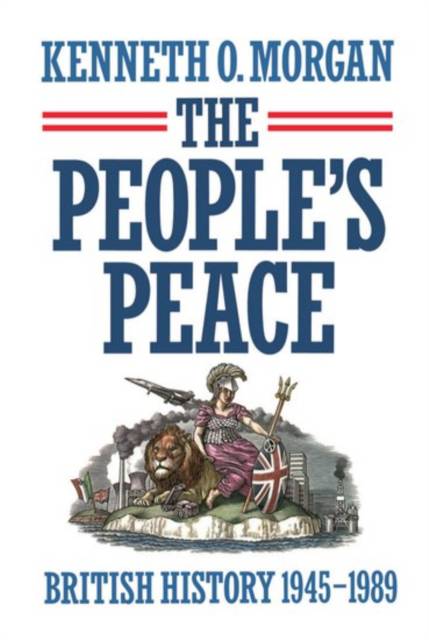
- Retrait gratuit dans votre magasin Club
- 7.000.000 titres dans notre catalogue
- Payer en toute sécurité
- Toujours un magasin près de chez vous
- Retrait gratuit dans votre magasin Club
- 7.000.0000 titres dans notre catalogue
- Payer en toute sécurité
- Toujours un magasin près de chez vous
169,45 €
+ 338 points
Format
Description
Kenneth Morgan has won wide acclaim as one of the finest historians of twentieth century Britain. His works have been hailed as "history at its very best" by New Society--the finest combination of rigorous scholarship and lucid, enjoyable writing. Now comes The People's Peace, the most comprehensive and authoritative look at post-war Britain ever written.
In The People's Peace, Morgan paints a richly detailed portrait of British social and political history from the end of the Second World War up through the rule of Margaret Thatcher. It was a time when the British, having pulled together to win what was called "the people's war," looked forward to a people's peace--a peace of plenty and equality, provided by the Labour government's dramatic new welfare programs. But Morgan shows how the nation staggered under the debt of the war, struggling to rebuild its economy for a rapidly changing world. He examines Britain's fitful retreat from its imperial legacy, depicting the surprising popularity of the withdrawal from India and other colonies, and the shock of the Suez Crisis--when the U.S. made Britain's reduced role in the world painfully clear. Morgan also provides an insightful look at the changing popular culture, from the Teddy Boys to the massive adulation of the Beatles, as well as rising consumerism, permissiveness, and the ugly racism that met the tide of African, Asian, and Caribbean immigrants.
From the debates over the welfare state, to the Profumo scandal, to the disillusionment with Wilson's chaotic Labour regime (leading to rumors of a military coup), to the crisis of strikes and economic decline that brought Margaret Thatcher to power, Morgan provides a lucid narrative of Britain's post-war politics. Even after Thatcher's apparent revival of the U.K.'s vitality, he writes, it still remains a land of tremendous inequality, split between a decaying industrial north and a growing high-tech south, the Celtic fringe and English heartland, the well-paid and the unemployed--locked into decades-old patterns. "In forty-four years," he writes, "the British had yet to recover from victory in the Second World War, even though the Germans and Japanese had so manifestly recovered from defeat."
In The People's Peace, Morgan paints a richly detailed portrait of British social and political history from the end of the Second World War up through the rule of Margaret Thatcher. It was a time when the British, having pulled together to win what was called "the people's war," looked forward to a people's peace--a peace of plenty and equality, provided by the Labour government's dramatic new welfare programs. But Morgan shows how the nation staggered under the debt of the war, struggling to rebuild its economy for a rapidly changing world. He examines Britain's fitful retreat from its imperial legacy, depicting the surprising popularity of the withdrawal from India and other colonies, and the shock of the Suez Crisis--when the U.S. made Britain's reduced role in the world painfully clear. Morgan also provides an insightful look at the changing popular culture, from the Teddy Boys to the massive adulation of the Beatles, as well as rising consumerism, permissiveness, and the ugly racism that met the tide of African, Asian, and Caribbean immigrants.
From the debates over the welfare state, to the Profumo scandal, to the disillusionment with Wilson's chaotic Labour regime (leading to rumors of a military coup), to the crisis of strikes and economic decline that brought Margaret Thatcher to power, Morgan provides a lucid narrative of Britain's post-war politics. Even after Thatcher's apparent revival of the U.K.'s vitality, he writes, it still remains a land of tremendous inequality, split between a decaying industrial north and a growing high-tech south, the Celtic fringe and English heartland, the well-paid and the unemployed--locked into decades-old patterns. "In forty-four years," he writes, "the British had yet to recover from victory in the Second World War, even though the Germans and Japanese had so manifestly recovered from defeat."
Spécifications
Parties prenantes
- Auteur(s) :
- Editeur:
Contenu
- Nombre de pages :
- 572
- Langue:
- Anglais
Caractéristiques
- EAN:
- 9780198227649
- Date de parution :
- 24-01-91
- Format:
- Livre relié
- Format numérique:
- Genaaid
- Dimensions :
- 152 mm x 229 mm
- Poids :
- 1038 g

Les avis
Nous publions uniquement les avis qui respectent les conditions requises. Consultez nos conditions pour les avis.






